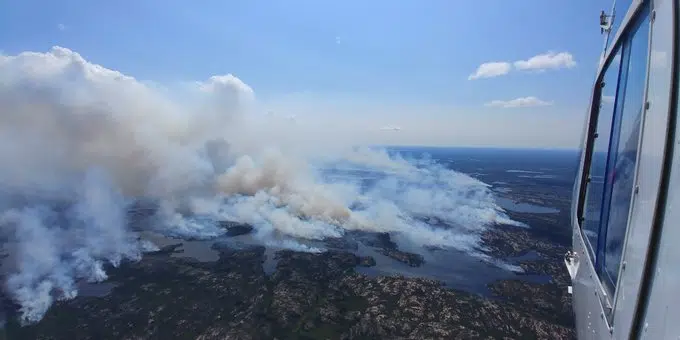
File Photo, Ontario Forest Fires Twitter. Kenora Fire #51
More than 3,000 people have now been evacuated across the northwest due to raging forest fires burning dangerously close to various communities.
Minister of Northern Development, Mines, Natural Resources and Forestry Greg Rickford and Solicitor General Sylvia Jones provided a fire update Monday morning.
Poplar Hill First Nation and Deer Lake First Nation have been completely evacuated, while vulnerable residents have been moved out of Pikangikum First Nation, North Spirit Lake First Nation and Cat Lake First Nation.
Government sources say as many as 5,000 more from there and other communities may have to be evacuated if the forest fire situation worsens.
Emergency Management Ontario continues to work with municipalities across the province that are providing support and assistance to evacuees.
Sixteen communities are now serving as host communities with the province reaching out for more.
The province reached out to Saskatchewan and Manitoba, but the fire situation and the pandemic are prohibiting evacuees from being housed there.
There are 600 firefighters from this province alone in the fight against some 138 wildfires.
Ontario is receiving help from several other provinces, as well as Wisconsin and Mexico.
The government notes a State of Emergency isn’t being declared at this time.
Various First Nation leaders and community leaders as well as some MPP’s are calling for the declaration to bring more support.
But officials say the criteria needed hasn’t been met.
They say they are responding effectively to the need to evacuate people and fight existing fires.
It’s been a busy year on the forest fire front across Ontario.
The province has already reported 902 fires to date, burning a total of 520,134 hectares of land.
That’s compared to 457 fires and 6,416 hectares this time last year.
The 10-year average is 520 and 153,513 respectively.
Current Status: Evacuations (approximates)
Deer Lake First Nation: Community population-1,090. Evacuations Requested-905. Community members evacuated to date-905.
Poplar Hill First Nation: Community population-700. Evacuations Requested-568. Community members evacuated to date-568.
Pikangikum First Nation: Community population-3,070. Evacuations Requested-1,221. Community members evacuated to date-1,221.
Cat Lake First Nation: Community population-650. Evacuations Requested-351. Community members evacuated to date-351.
North Spirit Lake First Nation: Community population-425. Evacuations Requested-98. Community members evacuated to date-98.
Total: Community population-5,935. Evacuations Requested-3,143. Community members evacuated to date-3,143.
Current Designated Host Communities
Cochrane, Sudbury, Kenora, Kapuskasing, Cornwall, Thunder Bay, Timmins, Sioux Lookout, Peel Region, Sault Ste. Marie, Hearst, Pickle Lake, Lac Seul First Nation, Dryden, King Township, Six Nations.
Declarations of Emergencies
Cat Lake First Nation: Due to fire/smoke threat to the community (Issued July 20)
Wauzhusk Onigam Nation: To host evacuees (Issued July 16)
City of Kenora: To host evacuees (issued July 16)
City of Dryden: To host evacuees (issued July 15)
City of Timmins: To host evacuees (issued July 14)
Town of Cochrane: To host evacuees (issued July 13)
Municipality of Red Lake: Due to fire/smoke threat to the community (issued July 12)
Pikangikum First Nation: Due to fire/smoke threat to the community (issued July 12)
Kapuskasing First Nation: To host evacuees (issued July 11)
City of Thunder Bay: To host evacuees (issued July 11)
Poplar Hill First Nation: Due to fire/smoke threat to the community (issued July 11)
Deer Lake First Nation: Due to fire/smoke threat to the community (issued July 10)
Naicatchewening First Nation: Due to fire/smoke threat to the community (issued June 24) *Fire is no longer affecting community but the declaration remains in place.
Joint Statement from Solicitor General Sylvia Jones and Minister Greg Rickford:
Our government, through Emergency Management Ontario and the Ministry of Northern Development, Mines, Natural Resources and Forestry, has committed significant resources to keep communities safe from wildfires across Ontario’s northwest and to support evacuations to host communities across the province.
This includes the evacuation of over 3,000 people through the complete evacuations of Poplar Hill First Nation and Deer Lake First Nation communities, and the evacuation of vulnerable residents of Pikangikum First Nation, North Spirit Lake First Nation, and Cat Lake First Nation. All requests for evacuations have been facilitated by the province, and over 600 wildland firefighters continue their efforts to contain and suppress the fires in the northwest, utilizing all available land and aerial equipment to protect people and property.
Emergency Management Ontario continues to work with municipalities across Ontario that are providing support and assistance to evacuees. We thank the many municipalities who have opened their communities to support evacuees and we continue to work collaboratively with municipal leaders to assess additional capacity, should it be required.
As this year’s wildfire season continues, we continue to support communities in the north, and remain ready to provide all necessary additional support as required. We are working closely with the federal government, which is responsible for the health, safety, and wellbeing of First Nation communities on-reserve. The province also continues to collaborate closely with affected First Nation communities, participating municipalities, the federal government, and the NGO sector to ensure that all necessary resources are deployed.


